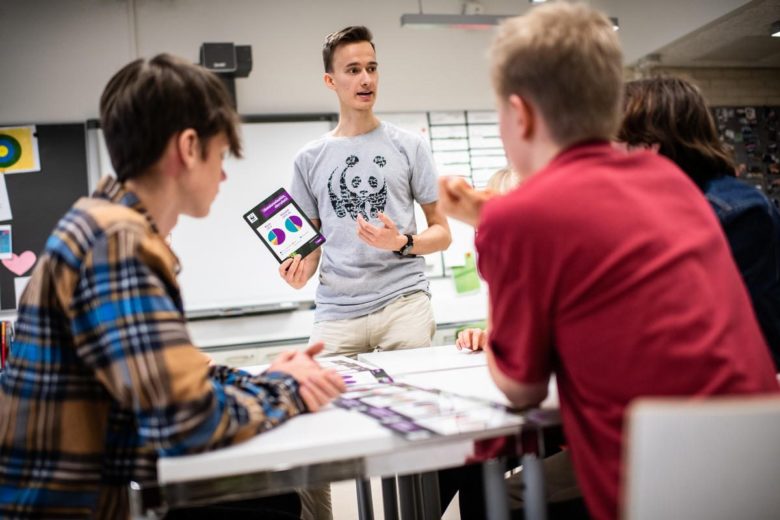WWF Bulgaria Launches Panda Labs to Stimulate Sustainable Innovation Among Young People

Climate change is one of the major challenges of the contemporary world. From changing weather patterns that threaten agricultural production to rising water levels that increase the risk of flooding, the impacts of climate change affect us all globally and traditional solutions may turn out to be outdated and inefficient pretty soon. According to many, the human intellect may be the key to solving this problem, as its ability to develop technological innovations is the only way out of this crisis. In practice, training the human intellect to brainstorm and come up with sustainable solutions is crucial, so how can different parties stimulate the younger generations who are expected to bring about the change?
One of the most recent additions to WWF Bulgaria’s project portfolio aims to stimulate the development of innovative local models for solving sustainability problems. It is called Panda Labs and in 2021 it will be happening for the first time in Bulgaria, with the support of America for Bulgaria Foundation. Young people aging 15-25 are to be the main actors in the initiative, as they will have to come up with innovative solutions for better waste and food management, as well as the future of mobility. The application process for the first cohort – “The future of waste” ends on January 31, 2021, and young enthusiasts are to enter the program in the second half of February. But what are the details?
A spreading network of sustainable innovation
In a nutshell, the goal of WWF, when they launched the Panda Labs project, was to establish partnerships with the enthusiastic local communities for “co-creation” and scaling of sustainable solutions. So far, WWF offices from all over the world are already working on developing projects, with Bulgaria being one of the recent additions to a list that includes Romania, Switzerland, Vietnam, Chile, Kenya, and Australia. The fields in which each local WWF organization is looking for solutions are based on the specifics of the country and on what seem to be the main environmental problems in its territory. With its sessions that are organized in themed “semesters”, WWF is also focused on promoting the importance of innovation and giving insight on how entrepreneurship can be stimulated. To exemplify, while WWF Vietnam is working on solving the enormous problem with excess plastic, it is also promoting the importance of having an innovation ecosystem. Romania, on the other hand, is focused on stimulating the community enterprise network and already has a pilot project that aims to restore the connection between humans and nature through experience in a specially created campus. On a global scale, Panda Labs is the project that led to the creation of Impactio – a project curation and funding platform which utilizes ethereum blockchain technology and tokenization to stimulate collaboration between field experts and individuals or organizations that would like to create or participate in sustainable projects. Another initiative that started off thanks to Panda Labs is OpenSC – a transparency solution that verifies claims about sustainable and ethical production using data science and machine learning to promote purchasing of more responsible products.
The project in Bulgaria
Each of the three topics: “Future of waste”, “Future of food”, and “Future of mobility”, will be organized into themed semesters. While participants will join the “Future of waste” semester online, the plan for the other two is that they will be on-ground, in Ruse and Sofia, later this year. The participants chosen must form their teams of between three and five people, with whom they will be developing a project idea. Every semester will include lectures on the given topic, as well as a hackathon, in which the teams will compete on the basis of their innovative ideas and solutions. The teams that perform the best during each hackathon will have the opportunity to participate in a masterclass to improve their knowledge in the spheres of business, innovation, and environmental protection with the help of representatives from the business, science, and non-governmental sectors in Bulgaria, including the start-up ecosystem.
After each themed round, the team with the best idea will receive financing of BGN10K to build a project prototype. Among the main objectives of the program is the introduction of youths to the STEM (science, technology, engineering, and mathematics) approach to learning. Applicants will also be familiarized with the SEL (social and emotional learning) model in order to build soft skills such as teamwork, project management, and leadership. “The future of waste” semester of Panda Labs is set to begin on February 19, in an online environment. The first panel of the semester will familiarize the participants with sustainable startups. Among the first lecturers is Gergana Stancheva from Lam’on, the startup that has developed biodegradable laminating film for the printing industry. Other names include Boryana Kirilova from Kool and Konscious, a startup for sustainable fashion, as well as Vera Markova from GreenRevolucia – the first online zero-waste products shop.




























